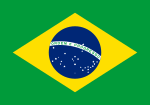
Back التعليم في البرازيل Arabic Образование в Бразилия Bulgarian Bildungssystem in Brasilien German Educación en Brasil Spanish Système éducatif au Brésil French Istruzione in Brasile Italian ブラジルの教育 Japanese Educação no Brasil Portuguese Educația în Brazilia Romanian
You can help expand this article with text translated from the corresponding article in Portuguese. (August 2019) Click [show] for important translation instructions.
|
 | |
| Ministry of Education | |
|---|---|
| Minister of Education | Camilo Santana |
| National education budget (2017) | |
| Budget | 5.95% of GDP; 15.72% of total government expenditure |
| General details | |
| Primary languages | Portuguese |
| System type | Federal, state, municipal, private |
| Literacy (2023) | |
| Total | 94.6%[1] |
| Male | 94.3% |
| Female | 94.8% |
Education in Brazil has had many changes. It first began with Jesuit missions,[2] that controlled education for a long time. Then, two hundred years after their arrival, their powers were limited by the Marquis of Pombal.[2] Shortly after the Jesuits' power was limited, the Brazilian government took over education and it is now run by the government through the Ministry of Education.[2]
Issues in education are now seen through PISA, the Programme for International Student Assessment, and the Idep assessment now used by the Ministry. They have historically tested below average on all topics but are improving in mathematics.[3]
Brazil uses both public and private school systems. They have the traditional primary, secondary, tertiary and technical school levels.
The Human Rights Measurement Initiative[4] finds that Brazil is doing 86.8% of what should be possible at its level of income for the right to education.[5]
- ^ "Tabela 7113: Taxa de analfabetismo das pessoas de 15 anos ou mais de idade, por sexo e grupo de idade". sidra.ibge.gov.br. Retrieved 2024-03-28.
- ^ a b c Cite error: The named reference
:7was invoked but never defined (see the help page). - ^ Cite error: The named reference
:2was invoked but never defined (see the help page). - ^ "Human Rights Measurement Initiative – The first global initiative to track the human rights performance of countries". humanrightsmeasurement.org. Retrieved 2022-02-25.
- ^ "Brazil - HRMI Rights Tracker". rightstracker.org. Retrieved 2022-02-25.
© MMXXIII Rich X Search. We shall prevail. All rights reserved. Rich X Search